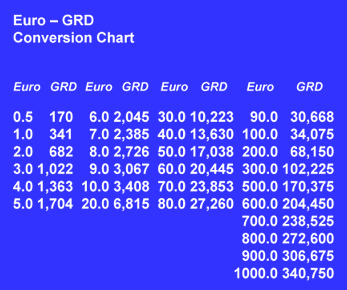|
|
|
|
By Christos and Mary Papoutsy, On January 1, 2002, the seven different denominations of banknote will become legal tender. On that date, more than 14 billion banknotes and 50 billion coins will be used in currency among 12 member states of the EuropeanUnion -- Austria, Belgium, Finland, France, Germany, Greece, Italy, Ireland, Luxembourg, Holland, Portugal and Spain
ECB president, William Duisenberg recently indicated that "on January 1, 2002 the euro will be in our pockets -- a tangible reality and not just the virtual market currency that it has thus far been perceived to be by many, if not most Europeans." The euro is a symbol of European integration in every sense of the word. A symbol of successful enterprise and initiative which has crossed borders and removed barriers to people working, trading and living in Europe. By January 1, 2002, 14.5 billion euro notes and 50 billion euro coins are scheduled to have made the journey back to safes and shop tills, with a risk of theft or counterfeiting a real possibility. Euro-confusion for US Tourists? There could be some confusion when euros will temporarily change hands alongside national currencies such as the Greek drachma Since it was launched 2 ½ years ago in electronic form, the new currency for 12 European countries has weakened by more than 25 percent against the dollar, making hotels, services and goods even cheaper for visiting Americans. When euro notes and coins are rolled out at the start of 2002, US tourists will get another bonus -- the hassle of changing money at every new border will disappear. That will be a big plus for tourists on the eight-day, five-country "Heart of Europe" coach tour offered by a Connecticut-based tourism agency. "We stay in the Netherlands and visit Belgium, Germany, Luxembourg and France. So we're always changing money," said Blair Soucy, president of Getaway Tours Inc. "On that tour, the euro will be a tremendous help for us." No kidding. For the millions of U.S. tourists, who visit Europe annually, the euro will end the queues and fees at exchange points at each European border, along with the confusing price calculations ("Twenty-five million Italian lire? Now what would that be in Greek drachma?") and the leftover jumble of coins weighing down pockets and purses at the end of each trip. For many Europeans, the euro -- which replaces the national currencies of Greece, Austria, Belgium, Finland, France, Germany, Ireland, Luxembourg, the Netherlands, Italy, Portugal and Spain generates mixed feelings. Tourism industry operators on either side of the Atlantic do not expect the switch to euro notes and coins to affect the number of US tourists visiting Europe. Last year was the eighth consecutive record year, with nearly 13 million visits. 2001 is expected to be a new record year, but visits are seen rising by only four percent, compared with nearly 11 percent last year, due in part to the slowing US economy as well as the outbreak of foot-and-mouth disease in Europe. "For the average traveler, currency exchange is not a driving force in any way shape or form as far as them going or not going," said Getaway Tours' Soucy. "The diseases, like foot and mouth and mad cow -- now that's something that will impact whether some go or don't go, as opposed to currency." But in a way, the introduction of the euro has already had an impact: its weakness against the US dollar has been a dramatic selling point to US holidaymakers. The euro started life at $1.17 per dollar in January 1999 and is now near record lows around $0.85, a casualty of investors' preference for US over European assets. What effect will a strong euro have on Greek inflation? |
|
|
|



